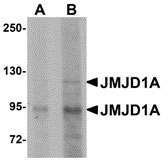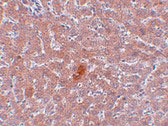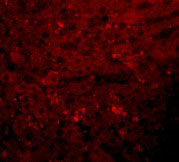JMJD1A Antibody
- 产品详情
- 实验流程
- 背景知识
Application
| WB, IF, E, IHC-P |
|---|---|
| Primary Accession | Q9Y4C1 |
| Other Accession | NP_060903, 20357522 |
| Reactivity | Human, Mouse, Rat |
| Host | Rabbit |
| Clonality | Polyclonal |
| Isotype | IgG |
| Calculated MW | 147341 Da |
| Concentration (mg/ml) | 1 mg/mL |
| Conjugate | Unconjugated |
| Application Notes | JMJD1A antibody can be used for detection of JMJD1A by Western blot at 1 - 2 µg/mL. Antibody can also be used for immunohistochemistry starting at 5 µg/mL. For immunofluorescence start at 20 µg/mL. |
| Gene ID | 55818 |
|---|---|
| Other Names | Lysine-specific demethylase 3A, 1.14.11.-, JmjC domain-containing histone demethylation protein 2A, Jumonji domain-containing protein 1A, KDM3A, JHDM2A, JMJD1, JMJD1A, KIAA0742, TSGA |
| Target/Specificity | KDM3A; This antibody will not cross-react with JMJD1B or JMJD1C. |
| Reconstitution & Storage | JMJD1A antibody can be stored at 4℃ for three months and -20℃, stable for up to one year. As with all antibodies care should be taken to avoid repeated freeze thaw cycles. Antibodies should not be exposed to prolonged high temperatures. |
| Precautions | JMJD1A Antibody is for research use only and not for use in diagnostic or therapeutic procedures. |
| Name | KDM3A |
|---|---|
| Synonyms | JHDM2A, JMJD1, JMJD1A, KIAA0742, TSGA |
| Function | Histone demethylase that specifically demethylates 'Lys-9' of histone H3, thereby playing a central role in histone code. Preferentially demethylates mono- and dimethylated H3 'Lys-9' residue, with a preference for dimethylated residue, while it has weak or no activity on trimethylated H3 'Lys-9'. Demethylation of Lys residue generates formaldehyde and succinate. Involved in hormone-dependent transcriptional activation, by participating in recruitment to androgen-receptor target genes, resulting in H3 'Lys-9' demethylation and transcriptional activation. Involved in spermatogenesis by regulating expression of target genes such as PRM1 and TNP1 which are required for packaging and condensation of sperm chromatin. Involved in obesity resistance through regulation of metabolic genes such as PPARA and UCP1. |
| Cellular Location | Cytoplasm. Nucleus. Note=Nuclear in round spermatids. When spermatids start to elongate, localizes to the cytoplasm where it forms distinct foci which disappear in mature spermatozoa (By similarity). |
For Research Use Only. Not For Use In Diagnostic Procedures.
Provided below are standard protocols that you may find useful for product applications.
BACKGROUND
JMJD1A Antibody: The jumonji domain containing 1A protein (JMJD1A) was originally discovered as a testes specific gene, but has been found to be expressed in numerous tissues. JMJD1A is a histone demethylase and specifically demethylates mono- and dimethyl-H3K9. It has also been found to be a novel interaction partner with ER71, a transcription factor expressed in the testes of adult mice and during embryogenesis. JMJD1A is also a downstream gene of STAT3, a protein that has been found to be important in the maintenance of mouse embryonic stem (mES) cells, and decreased JMJD1A expression correlated with the differentiation of cultured mES cells following the removal of the cytokine LIF. These findings suggest that JMJD1A might be a critical signaling molecule underlying the maintenance of pluripotency in embryonic stem cells. At least two isoforms of JMJD1A are known to exist.
REFERENCES
Hoog C, Schalling M, Grunder-Brundell E, et al. Analysis of a murine male germ cell-specific transcript that encodes a putative zinc finger protein. Mol. Reprod. Dev.1991; 30:173-81.
Sar A, Ponjevic D, Nguyen M, et al. Identification and characterization of demethylase JMJD1A as a gene upregulated in the human cellular response to hypoxia. Cell Tissue Res.2009; 337:223-34.
Yamane K, Toumazou C, Tsukada Y, et al. JHDM2A, a JmjC-containing H3K9 demethylase, facilitates transcription activation by androgen receptor. Cell2006; 125:483-95.
Knebel J, De Haro L, and Janknecht R. Repression of transcription by TSGA/Jmjd1a, a novel interaction partner of the ETS protein ER71. J. Cell Biochem.2006; 99:319-29.
终于等到您。ABCEPTA(百远生物)抗体产品。
点击下方“我要评价 ”按钮提交您的反馈信息,您的反馈和评价是我们最宝贵的财富之一,
我们将在1-3个工作日内处理您的反馈信息。
如有疑问,联系:0512-88856768 tech-china@abcepta.com.























 癌症的基本特征包括细胞增殖、血管生成、迁移、凋亡逃避机制和细胞永生等。找到癌症发生过程中这些通路的关键标记物和对应的抗体用于检测至关重要。
癌症的基本特征包括细胞增殖、血管生成、迁移、凋亡逃避机制和细胞永生等。找到癌症发生过程中这些通路的关键标记物和对应的抗体用于检测至关重要。 为您推荐一个泛素化位点预测神器——泛素化分析工具,可以为您的蛋白的泛素化位点作出预测和评分。
为您推荐一个泛素化位点预测神器——泛素化分析工具,可以为您的蛋白的泛素化位点作出预测和评分。 细胞自噬受体图形绘图工具为你的蛋白的细胞受体结合位点作出预测和评分,识别结合到自噬通路中的蛋白是非常重要的,便于让我们理解自噬在正常生理、病理过程中的作用,如发育、细胞分化、神经退化性疾病、压力条件下、感染和癌症。
细胞自噬受体图形绘图工具为你的蛋白的细胞受体结合位点作出预测和评分,识别结合到自噬通路中的蛋白是非常重要的,便于让我们理解自噬在正常生理、病理过程中的作用,如发育、细胞分化、神经退化性疾病、压力条件下、感染和癌症。








